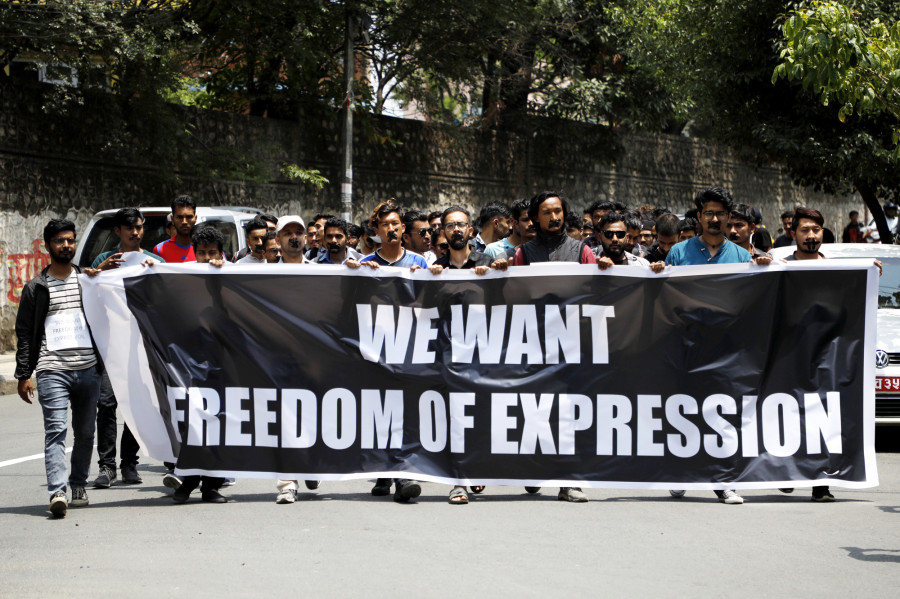National
Freedom of expression is under attack and transitional justice stalled in Nepal, rights group says
Amnesty International in its global report has painted a bleak picture of Nepal’s human rights situation and pointed at government’s regressive ways to restrict freedom.
Binod Ghimire
Nepal is increasingly resorting to regressive ways to restrict freedom, Amnesty International said on Thursday.
In its annual human rights report, the rights group has pointed out that the government made arbitrary arrests of journalists for criticising the government and individuals online. It has also criticised the attempts of incumbent KP Sharma Oli administration for introducing different laws that are targeted at curtailing the right to freedom of expression.
The apathy of the government towards providing justice to the thousands of victims of decade-long Maoist insurgency and the cases of extra-judicial killings also have found the place in the report.
“Over the past year, we have seen the country increasingly resort to repressive methods to restrict freedoms. Journalists were arrested simply for doing their jobs, singers were imprisoned solely for the content of their songs and civil society came under greater pressure,” said Biraj Patnaik, South Asia Director at Amnesty International.
At least four arrests were made last year citing the provisions of the Electronic Transaction Act 2006 which included Arjun Giri, a Pokhara-based journalist, who had written about a fraud case involving Bipendra Raj Batas of automobile conglomerate Batas Organisation. Similarly, comedian Pranesh Gautam was arrested for posting a satirical film review on YouTube in June last year. In October, singers Durgesh Thapa and Samir Ghising too were taken into custody by the police claiming their creations promoted anti-social values.
The report has described an amendment bill on the National Human Rights Commission Act as a step to undermine the independence and autonomy of the constitutional watchdog. The bill has a provision to allow the Attorney General to decide on the prosecution of the cases of human rights violations recommended by the commission.
The report has also pointed at the incumbent government’s attempts to use excessive force even in peaceful protests. “Police failed to maintain restraints in the protest against the Guthi bill in June last year,” it said.
Similarly, Sajor Narayan Mahato from Sarlahi district had to lose his life in the police action during the protest. “The authorities did not investigate allegations of excessive use of force and deaths that occurred during demonstrations.”
The extrajudicial killings of Kumar Poudel in Sarlahi and Tirtha Raj Ghimire in Bhojpur have also been included in the report. Both the men were killed after they were arrested but the concerned authorities did not investigate the killings, it said.
The National Human Rights Commission after its investigation had concluded that Poudel was shot dead after an arrest and had recommended that the government lodge a criminal charge against the police officials involved in the killing. However, even three months after, the commission’s recommendation remains unaddressed.
Rights activists say it is worrying that the human rights situation is deteriorating rather than improving which is a clear indication that the country is taking a regressive path.
“The government must take Amnesty International’s report seriously and act to improve the issues it has pointed out,” Charan Prasai, a human rights activist, told the Post.
According to Prasai, reports from organisations like Amnesty provide a base for the international community to build their perspective about Nepal.
The report has also drawn the Nepal government’s attention to its failure to deliver truth, justice and reparation for thousands of victims of crimes under international law and other serious violation of international human rights law committed during the decade-long armed conflict.
The international community has long been urging Nepal to conclude the transitional justice process, which has been dragging on for more than a decade now.
On January 14, Human Rights Watch in its world report also had said Nepal had failed to ensure justice to conflict victims and the government was putting new limits on freedom of expression and association.
“I believe our leadership doesn’t want Nepal to be compared with the countries that have earned notoriety for not respecting human rights,” said Prasai. “This report is a wake-up call for Nepal.”




 9.7°C Kathmandu
9.7°C Kathmandu














